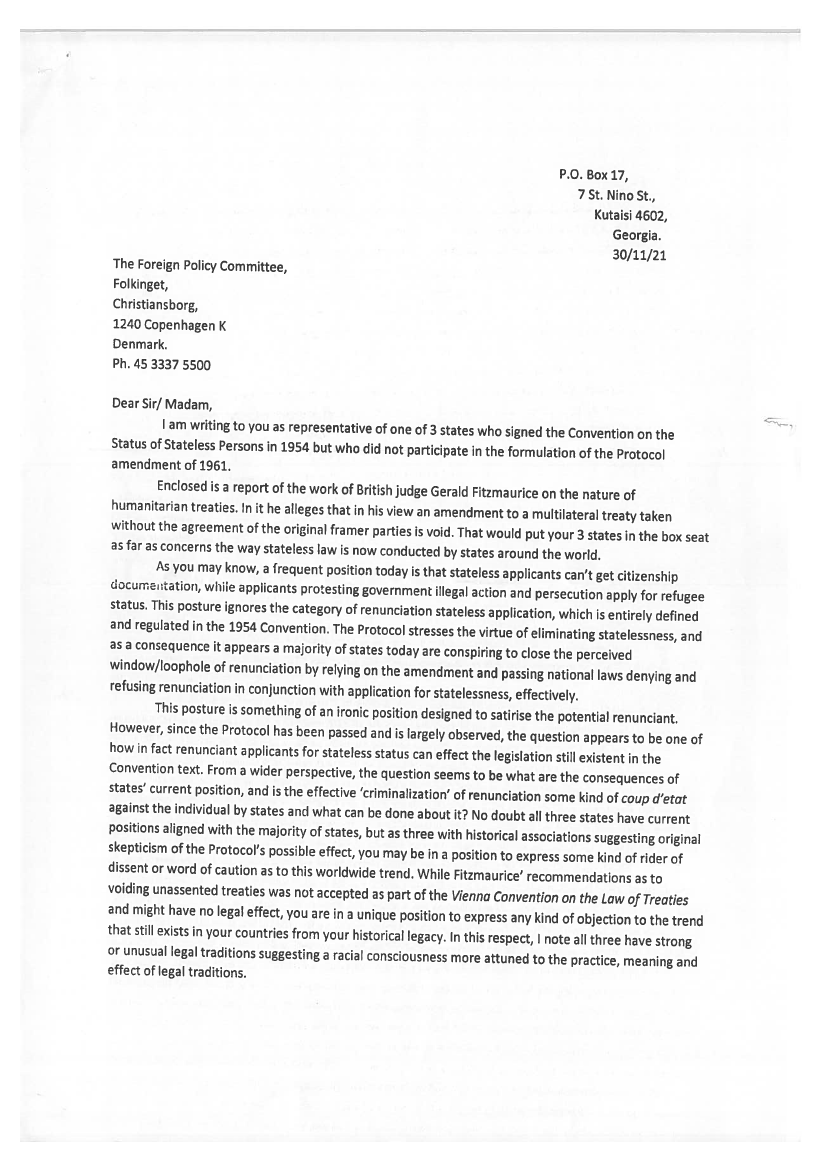
The Foreign Policy Committee,
Folkinget,
Christiansborg,
1240 Copenhagen K
Denmark.
Ph. 45 3337 5500
P.O. Box 17,
7 St. Nino St.,
Kutaisi 4602,
Georgia.
30/11/21
Dear Sir! Madam,
I am writing to you as representative of one of 3 states who
signed the Convention on the
Status of Stateless Persons in 1954 but who did flot partic
ipate in the formulation of the Protocol
amendment of 1961.
Enciosed is a report of the work of British judge Gerald Fitzm
aurice on the nature of
humanitarian treaties. In it he alleges that in his view an amen
dment to a multilateral treaty taken
without the agreement of the original framer parties is void.
That would put your 3 states in the box seat
as far as concerns the way stateless law is now conducted
by states around the world.
As you may know, a frequent position today is that statel
ess applicants can’t get citizenship
docurneiation, whiie app)icants protesting government iflega
l action and persecution apply for refugee
status. This posture ignores the category of renunciation
stateless application, which is entirely defined
and regulated in the 1954 Convention. The Protocol stress
es the virtue of eliminating statelessness, and
as a consequence it appears a majority of states today
are conspiring to close the perceived
window/loophole of renunciation by relying on the amen
dment and passing national Iaws denying and
refusing renunciation in conjunction with apptication
for statelessness, effectively.
This posture is something of an ironic position designed
to satirise the potential renunciant.
However, since the Protocol has been passed and is large
ly observed, the question appears to be one of
how in fact renunciant applicants for stateless status can
effect the legislation still existent in the
Convention text. From a wider perspective, the question
seems to be what are the consequences of
states’ current position, and is the effective ‘criminalization
’ of renunciation some kind of
coup d’etat
against the individual by states and what can be done abou
t it? No doubt alI three states have current
positions aligned with the majority of states, but as three
with historical associations suggesting original
skepticism of the Protocol’s possible effect, you may be
in a position to express some kind of rider of
dissent or word of caution as to this worldwide trend. Whil
e Fitzmaurice’ recommendations as to
voiding unassented treaties was flot accepted as part of
the
Vienna
Convention on
the Low ofTreaties
and might have no legal effect, you are in a unique posit
ion to express any kind of objection to the trend
that still exists in your countries from your historical legac
y. In this respect, I note alI three have strong
or unusual legal traditions suggesting a racial consciousness
more attuned to the practice, meaning and
effect of legal traditions.